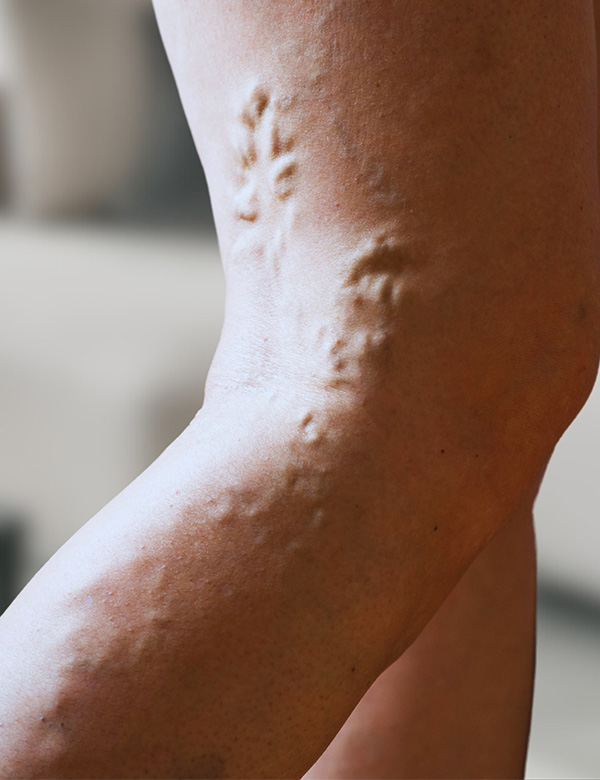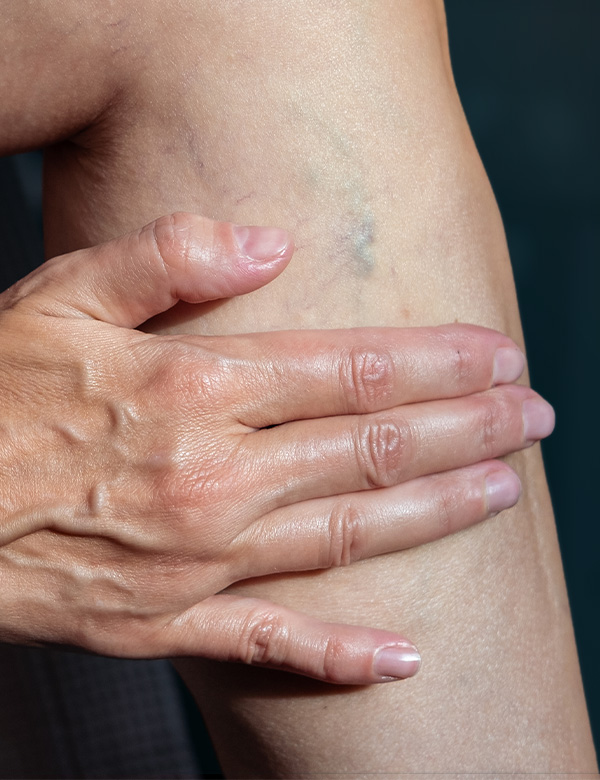Assessment of Vein Weakness
Prevent varicose veins, detect weak veins early – get a thorough assessment and advice by an experienced dermatologist at Derma Medical Clinic in Zurich – Sihlcity
Assessment of Vein Weakness
Chronische Abszesse und schmerzhafte Knoten durch erfahrenen Hautarzt abklären und behandeln in der Derma Medical Clinic in Zürich - Sihlcity
Heavy, tired or swollen legs – detect and treat weak veins early using modern ultrasound diagnostics
Examinations
Vein ultrasound
Procedure
Initial consultation
Ultrasound
Evaluation
Duration
30 minutes
What is vein weakness?
The veins in your legs have an important job: they carry blood back to your heart – uphill, against gravity. To help with this, there are small valves inside the veins that act like one-way doors.
If these valves don’t close properly, some blood can flow backwards and pool in the legs. Over time, this build-up can cause heaviness, tiredness, swelling, or tightness in the legs. Some people also experience cramps in the calves at night.
If vein weakness goes undetected, it can worsen and lead to varicose veins. The earlier it’s found, the easier it is to treat or slow down.
It’s a good idea to check how your veins are functioning if you:
- regularly have heavy, tired or swollen legs
- feel pressure in your legs after standing or sitting for a long time
- notice changes like swollen ankles or visible veins
- are unsure whether your symptoms come from a vein issue or fluid build-up
- have a family history of vein problems or developed symptoms after pregnancy
- want to prevent possible varicose veins early on

What is vein weakness?
The veins in your legs have an important job: they carry blood back to your heart – uphill, against gravity. To help with this, there are small valves inside the veins that act like one-way doors.
If these valves don’t close properly, some blood can flow backwards and pool in the legs. Over time, this build-up can cause heaviness, tiredness, swelling, or tightness in the legs. Some people also experience cramps in the calves at night.
If vein weakness goes undetected, it can worsen and lead to varicose veins. The earlier it’s found, the easier it is to treat or slow down.
Who should get their veins checked?
It’s a good idea to check how your veins are functioning if you:
- regularly have heavy, tired or swollen legs
- feel pressure in your legs after standing or sitting for a long time
- notice changes like swollen ankles or visible veins
- are unsure whether your symptoms come from a vein issue or fluid build-up
- have a family history of vein problems or developed symptoms after pregnancy
- want to prevent possible varicose veins early on
Treatment
A special ultrasound technique is used to examine the veins in your legs. This shows in real time how the blood flows through the veins and whether the valves are working properly. The test is painless, takes only a few minutes, and delivers reliable results.
What happens after the test?
If vein weakness is detected, we will talk with you about the next steps: from preventive measures like compression stockings or exercise, to possible further treatment.
Our goal: relieve your symptoms, prevent varicose veins and improve your quality of life long term.
How does a vein check work?
Initial consultation
At your first appointment, we’ll discuss your symptoms, any past conditions, and possible risk factors.
Ultrasound of the leg veins
Then we’ll perform an ultrasound to see how the blood flows in your veins.
Evaluation and discussion
We’ll explain whether vein weakness is present, how severe it is, and whether treatment makes sense.

At Derma Medical Clinic, diagnosis and treatment of vein conditions is performed by Dr. Benjamin Miller, a specialist in dermatology and phlebology.
He has many years of experience in diagnosing and treating vein conditions.

Dr. med. Andreas Gutwein
Specialist in Angiology and General Internal Medicine FMH
Expert in Vascular Medicine & Men’s Health

Dr. med. Benjamin Miller
Board-certified Specialist in Dermatology & Venereology FMH
What to expect from us
Thorough ultrasound diagnostics on site
We use modern ultrasound technology to precisely assess blood flow and valve function directly in our clinic — no need to go elsewhere.
Gentle approach to vein care
No rushed treatments: We take your symptoms seriously and give honest advice on whether it’s best to wait, use compression, or consider further treatment.
Experienced vein specialist
Vein issues often show up gradually and can be hard to understand. Our specialist takes time to examine thoroughly, explain clearly, and guide you step-by-step if treatment is needed.
Everything in one place
You’ll receive diagnostics, medical care, and cosmetic support all in one place. That means fixed contact persons, short ways, and coordinated care — from your first appointment to follow-up.
Do your legs feel heavy, tense or swollen, especially at night or after long periods of standing?
Book an appointment now to check your vein function at Derma Medical Clinic in Zurich – Sihlcity.
FAQ – Common questions about vein weakness
What is vein weakness?
Vein weakness – medically called chronic venous insufficiency – means the veins aren’t working properly and blood doesn’t flow well back to the heart. This can cause it to build up in the legs, leading to swelling, a feeling of pressure, or visible vein changes.
How can I recognize vein weakness?
Common signs include:
- heavy or tired legs (especially in the evening)
- swelling in the ankles or lower legs
- tightness, pressure or pulling pain
- visible, bulging veins
- skin changes like brown discoloration or rashes
What causes vein weakness?
Typical causes include:
- genetic predisposition
- sitting or standing jobs
- hormonal changes (e.g. during pregnancy)
- being overweight, lack of exercise, or vein inflammation
The risk increases with age.
How dangerous is chronic venous insufficiency?
If left untreated, it can lead to serious complications such as varicose veins, skin changes, vein inflammation, or — in the worst case — leg ulcers. That’s why early assessment is important.
How is vein weakness diagnosed?
The main test is a duplex ultrasound. This allows the doctor to check how the vein valves are working and see if blood is flowing backward. The test is painless and gives accurate results.
What treatment options are available?
Depending on the condition, treatment options include:
- compression therapy with special stockings
- exercise to improve blood return
- sclerotherapy, laser or surgery for varicose veins
- skin care for early changes
The goal is to reduce blood buildup and avoid long-term issues.
When should I have my veins checked?
If you regularly have heavy or swollen legs, or notice visible changes in your veins. It’s also helpful if vein problems run in your family or you’ve had a blood clot before.
How can I prevent vein weakness?
- move regularly (e.g. walking, cycling)
- avoid sitting or standing for long periods
- elevate your legs when possible
- maintain a healthy weight
- wear compression stockings if recommended

